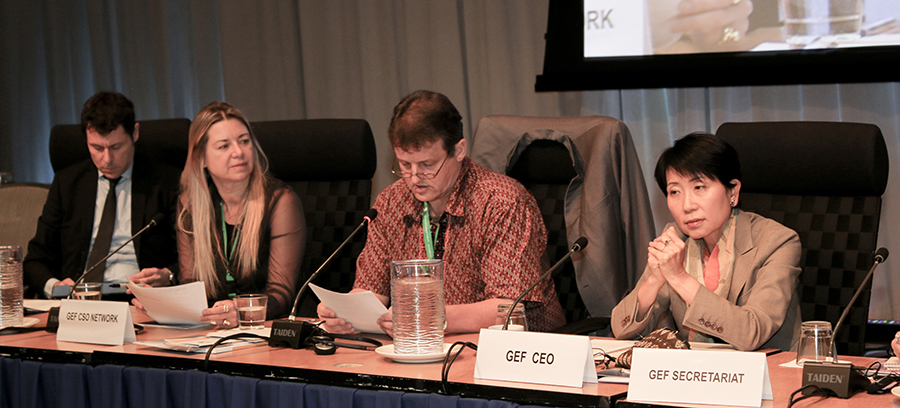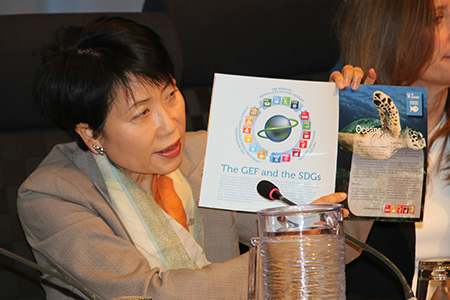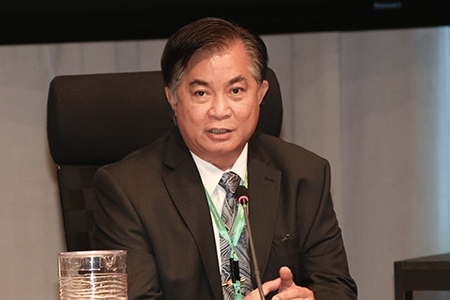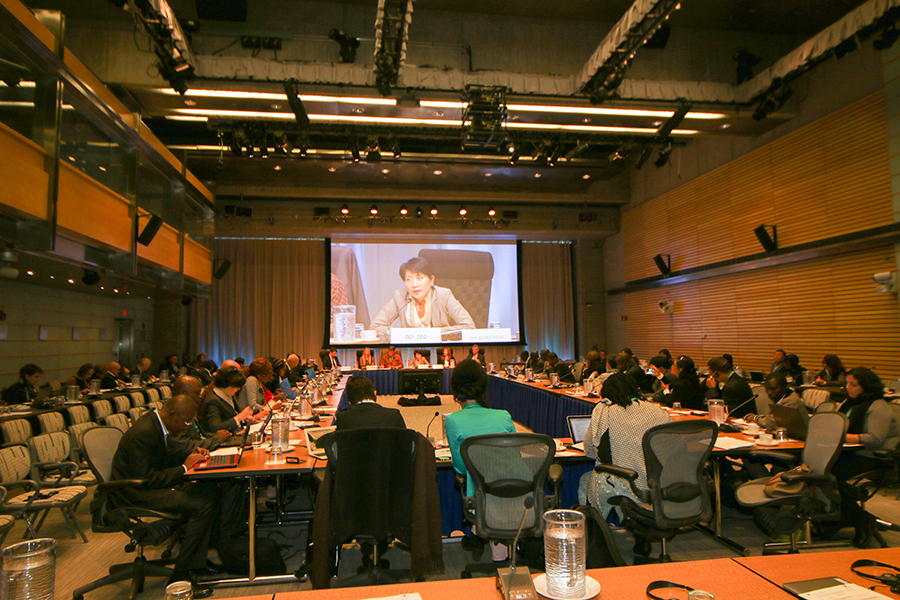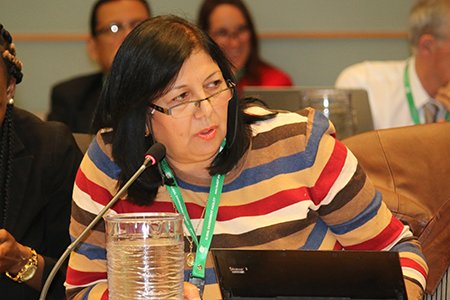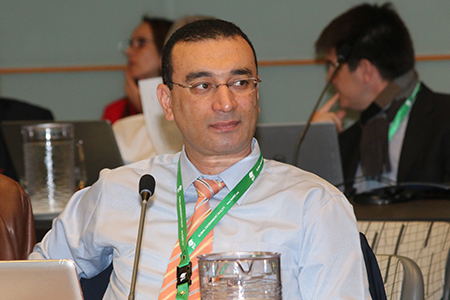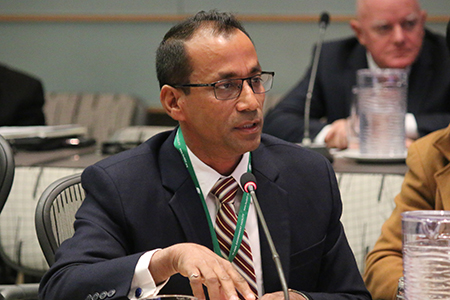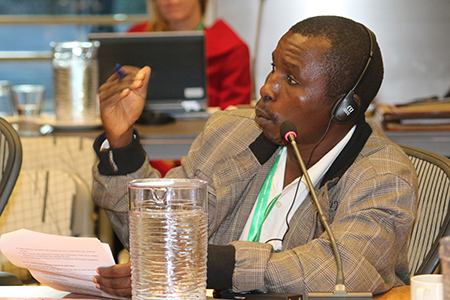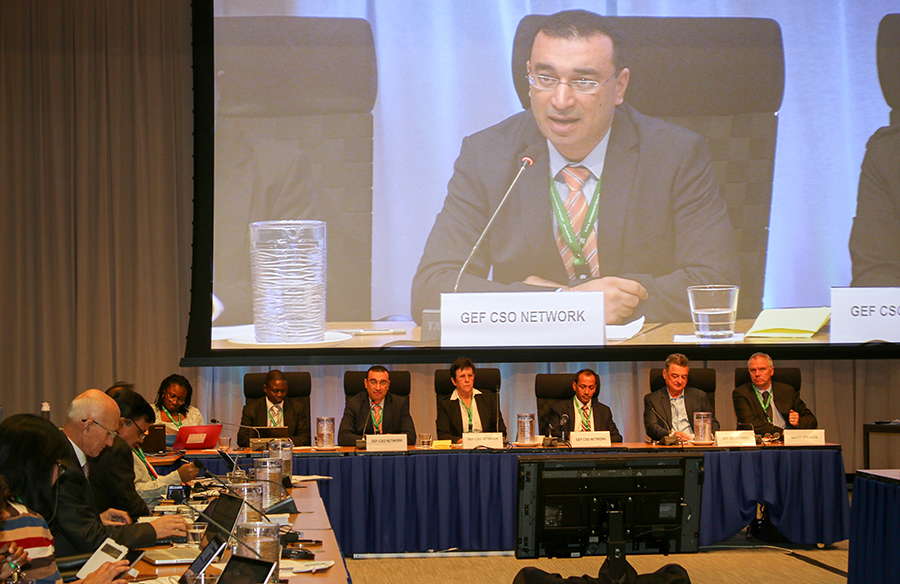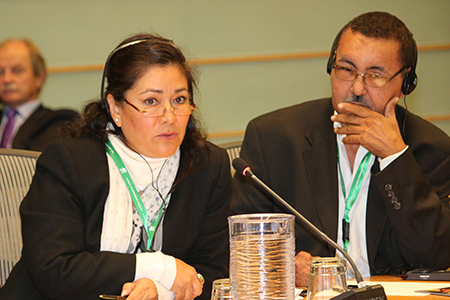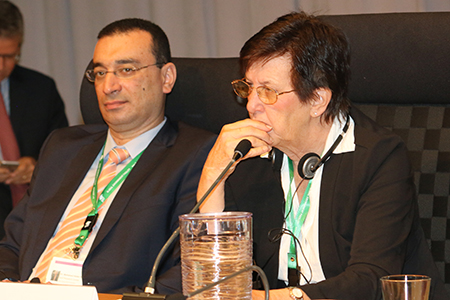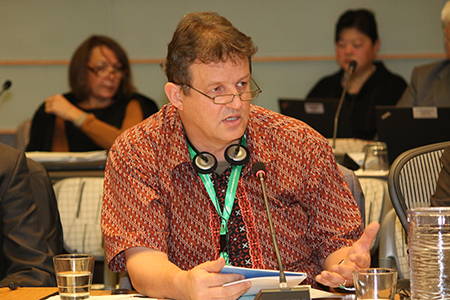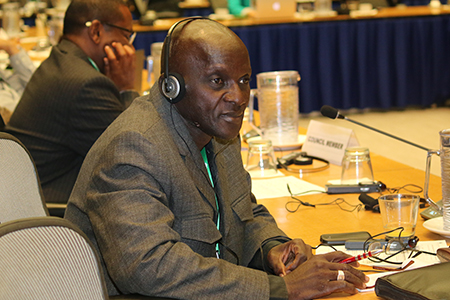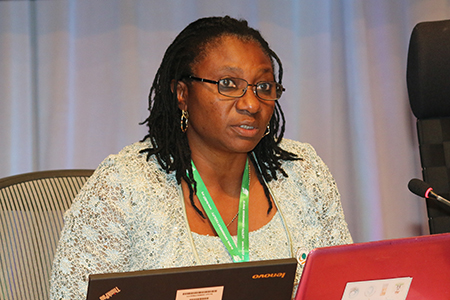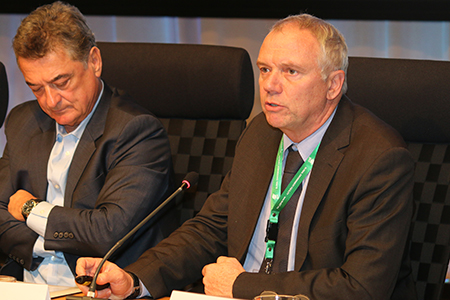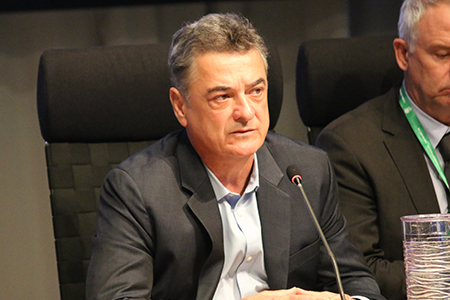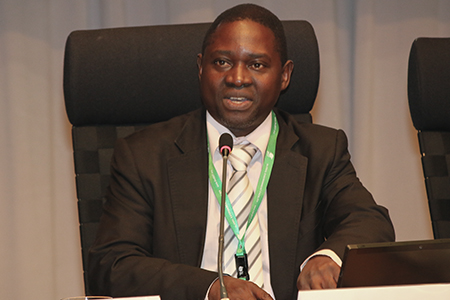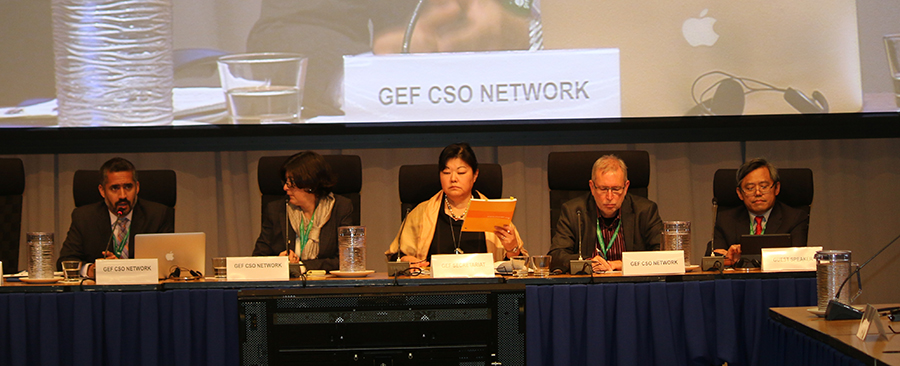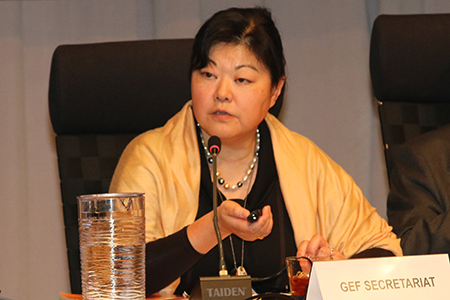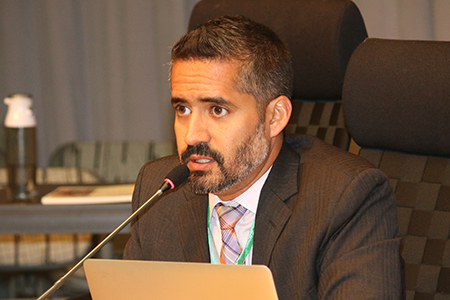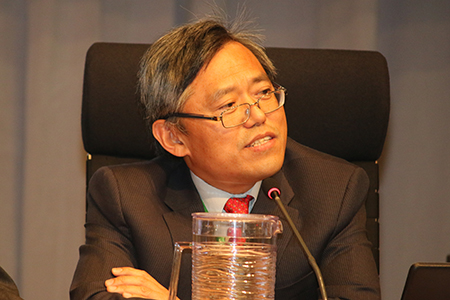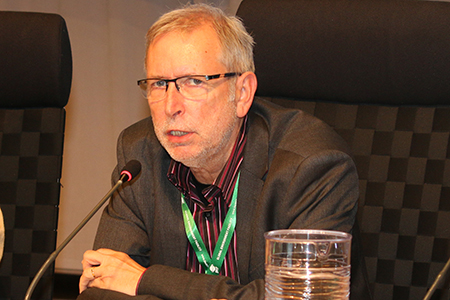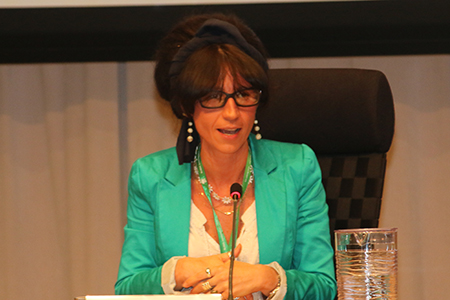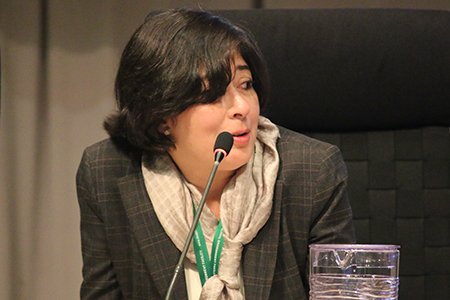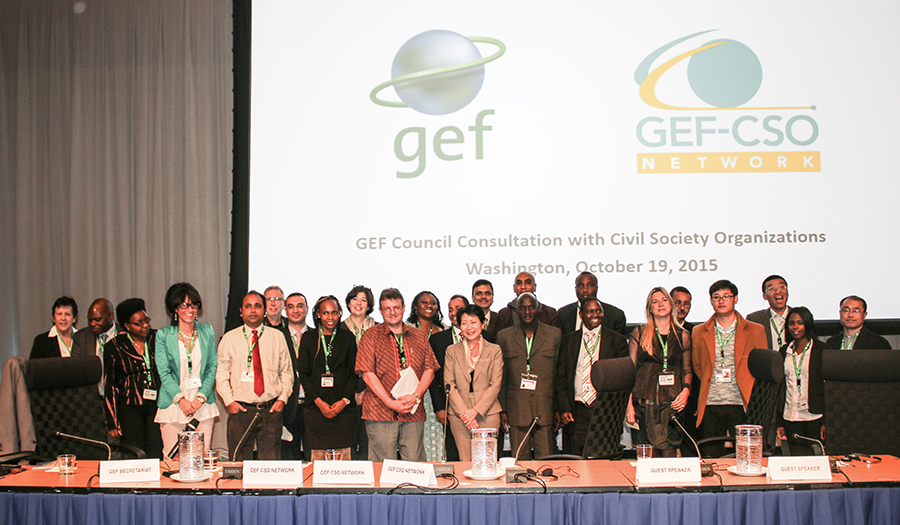Global Environment Facility (GEF) Council Consultation Meeting with Civil Society Organizations (CSOs), GEF 49th Council Meeting and 19th Meeting of the Least Developed Countries Fund
and the Special Climate Change Fund (LDCF/SCCF) Council
19-22 October 2015 | World Bank headquarters, Washington, DC, United States of America
Highlights for Monday, 19 October 2015
Download ENB+ Meeting Report |
||||||
Receive our ENB+ bulletins and reports by email: |
||||||

| Follow @IISDRS | ||

Loading... |
||
|
Receive emailed updates with the news articles above plus related information and announcements from our SDG community mailing list: |
||

Globe hanging outside the Preston Auditorium, World Bank Main Complex |
||
|
IISD Reporting Services, through its ENB+ Meeting Coverage, has provided daily web coverage and published a summary report of the Global Environment Facility (GEF) Council Consultation meeting with Civil Society Organizations (CSOs) and GEF 49th Council Meeting which is available in HTML or PDF format. Available in ENB Mobile at: http://enb.iisd.mobi/gef-council49/ |
||
has been provided by the GEF
GEF COUNCIL CONSULTATION MEETING WITH CIVIL SOCIETY ORGANIZATIONS
Session 1: CSO Dialogue with the GEF CEO and Chairperson: The GEF Council Consultation Meeting with Civil Society Organizations (CSOs) took place on Monday, 19 October 2015. Faizal Parish, Central Focal Point (CFP), GEF-CSO Network, noted the importance of engagement between GEF Council representatives and civil society on global environmental challenges. GEF CEO and Chairperson Naoko Ishii applauded the centrality of environment in the new Sustainable Development Goals (SDGs). She highlighted the GEF’s strategic investments to global environmental goals, which have additional impacts on poverty and development, and the importance of innovative financing such as the GEF’s Non-Grant Pilot Instrument, which mobilizes private sector funds to finance action on climate change. Discussion: Issues raised centered on inter alia the: cross cutting nature of knowledge management; role of the SDGs in channelling more funding to the environment and the GEF; need to move beyond the inter-governmental framework for tackling environmental issues to a more multi-stakeholder approach; and role of new data and technology in GEFs work. |
|
||||||||||||
|
|
|
|
|
|
|
|
Session 2: Partnerships with Civil Society to meet GEF’s Targets and Sustainable Development Goals (SDGs) Mohamed Raouf, Regional Focal Point (RFP), West Asia, GEF-CSO Network, said the GEF’s mission contributes to all SDGs and called for new holistic partnerships. Akhteruzzaman Sano, South-east Asia RFP, highlighted the CSO Network’s new governance structure and its recommendations on the Public Involvement Policy and enhanced CSO engagement. Gustavo Fonseca, GEF Secretariat, reported on the GEF contributions to SDGs on climate, life below water and on land, and partnerships. Olivier Langrand, Executive Director, Critical Ecosystem Partnership Fund (CEPF) highlighted CEPF activities aimed at enhancing civil society participation in biodiversity conservation through regional implementation teams. On lessons learned, he recommended: working at the ‘hotspot’ rather than country level and taking a long-term view in terms of investing in CSOs. Priscilla Achakpa, RFP, West Africa, GEF-CSO Network, noted the role of CSOs in implementing, monitoring and ensuring accountability of GEF projects. She highlighted the GEF Gender Partnership Policy as a critical tool in measuring impacts on gender. Godwin Fishani Gondwe, GEF Council Member, Zambia, highlighted the need to strengthen institutional memory of the GEF both at the national and regional level and to institutionalise GEF national political focal points. Discussion: In response to questions on the relationship between the GEF and the Green Climate Fund (GCF) and maintaining GEF’s core mission and goals, Fonseca noted that the GEF and the GCF relations are still being constructed building upon what the GEF has done over 24 years. He emphasized the need to ensure that GEF’s core mission is not diluted, explaining that the GEF has started reporting to Conventions on GEF activities that result in multiple benefits. On lessons learned regarding implementation, Langrand outlined that CEPF’s work with regional and national NGOs has enabled the NGOs to become trusted government partners and allows CEPF to continue work on conservation in areas experiencing difficulties, such as Libya. Responding to a question on the integration of disaster risk reduction into the GEF’s work, Fonseca explained that the GEF Secretariat is discussing how to mainstream resilience within the entire GEF portfolio. On gender mainstreaming, Achakpa responded that gender reports and policies are often not implemented, even among the GEF agencies, and that there is a need for better monitoring and disaggregated data on funds allocated to gender issues. |
|
|
|
|
|
|
|
|
|
Session 3: Civil Society and Conventions Implementation On the GEF and climate change, Ramon Cruz, RFP, North America, GEF CSO Network discussed: how the GEF will evolve and interact with the GCF; how post-2020 ambition will be addressed in the new financial architecture, and what will happen between now and 2020. Chizuru Aoki, GEF Secretariat, said the GEF’s role is to effectively operationalize the UN Framework Convention on Climate Change (UNFCCC) Conference of the Parties (COP) decisions and guidance and called for coordination and complementarity between different funds and financial institutions. Günter Mitlacher, CBD Expert Team, outlined the Convention on Biological Diversity (CBD) COP decision XII/30 for a participatory funding needs assessment to inform the GEF-7 replenishment negotiations. He noted that only two countries have returned questionnaires on funding needs over the next five years and urged Council Members and CSOs to push their governments to submit them. Ravi Sharma, CBD Secretariat, explained that a top-down funding needs assessment had been attempted before with limited success. Discussion: Participants raised questions on inter alia: meeting adaptation demands within the next five years; lack of parity between the adaptation and mitigation GEF portfolios; needs assessment and replenishment negotiations; mainstreaming biodiversity over different sectors; and what the CSO network needs to do in the lead up to the Paris Climate Change Talks. Closing Co-moderator Nana Janashia, RFP Eastern Europe and Central Asia, GEF-CSO Network summarized discussions on Public Investment Policy Review, knowledge management reform, and the role of CSOs in catalyzing action on the ground. |
|
|
|
|
|
|
|





